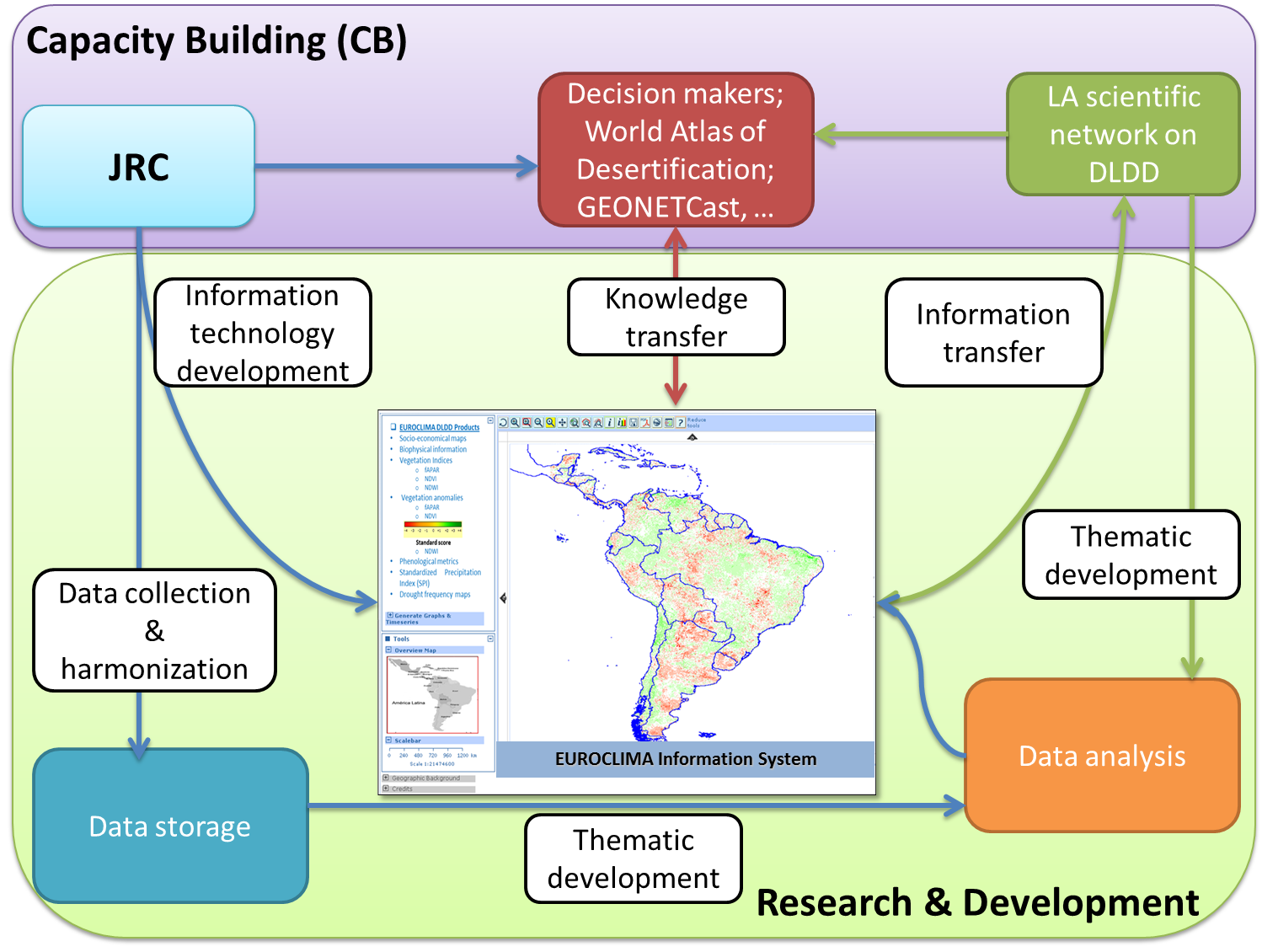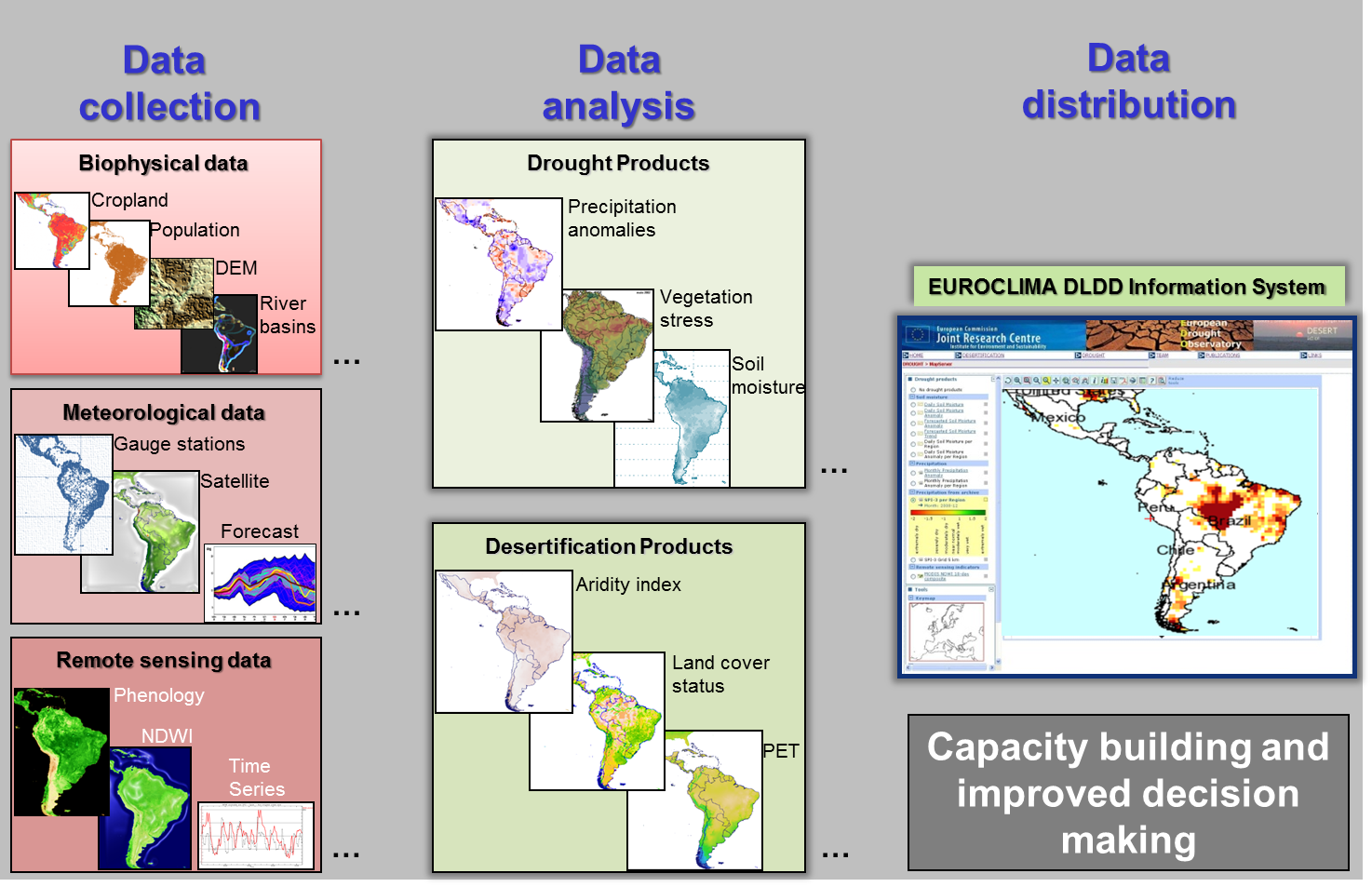Drought, Land Degradation and Desertification (DLDD) Activities
The JRC's Climate Risk Management Unit was responsible for developing methodologies and tools for monitoring and assessing drought events and the problem of land degradation and desertification from national to regional scales in the Latin American region. The essential activities of the EUROCLIMA Desertification, Land Degradation and Drought (DLDD) component are:- to allow for the coordinated collection, harmonisation, analysis, and distribution of relevant data and products for assessing and monitoring DLDD in Latin America – Research and Development (R&D) activity;
- to improve the knowledge of the Latin American decision makers and the scientific community on the problems and consequences of DLDD – Capacity Building (CB) activity;
- to contribute to a long-term regional and continental information system on drought and desertification – from R&D to CB activities.

Multi-scale data and products will be provided by the JRC and Latin American institutional partners. These will constitute the basis for retrieving added value information on DLDD from local to continental scales over the Latin American region. The products to be delivered to the Latin American community will be defined in common agreement with the Latin American experts on DLDD, in order to cover all requirements of users in the region. Specifically, the Climate Risk Management Unit of the JRC will actively contribute to the EUROCLIMA Programme by executing the following work packages:
- Establishment of a Latin American scientific network on DLDD;
- Data collection and harmonisation;
- Data analysis:
- Computation of the Standardized Precipitation Index (SPI);
- Computation of phenological metrics (from remote-sensing data);
- Mapping drought hazard (based on drought frequency);
- Implementation of an Information System on DLDD through a web-based platform.

EUROCLIMA DLDD work packages
Capacity building
The final beneficiary of the EUROCLIMA Programme is the Latin American community, which will profit from the increased capacity of Latin American institutional partners in managing natural resources at the continental level. Therefore, most of the technical activities are implemented directly by the JRC in close collaboration with local institutions. All the information produced will be made available to interested parties through scientific meetings, workshops, publications, the web-based information system and the increased expertise of the involved national organisations.
Data collection, harmonisation and analysis
Data collection, harmonisation and analysis are ongoing activities that are promoted throughout the Programme, as new data can at any moment be added to and modified in the final information system. The continental-scale products will be proposed and prepared by the Climate Risk Management Unit, but the Latin American scientific community and stakeholders are expected to provide feedback on their quality and usability, in order to increase the added value of the system.
A subsidiarity principle characterises the overall approach to the information system: decentralised information, i.e. national data managed and maintained by national Latin American partners, but accessible through a common web-based platform. The idea is to use the data provided by Latin American national institutions in the establishment of specific and representative case studies from local to national scales, to compare indices derived at the national scale with information derived at the regional and continental scales, and to improve the whole database of the Latin American DLDD scientific network.
EUROCLIMA DLDD Information System
The DLDD Information System is expected to be a dynamic structure. The web-based platform will be developed by the JRC, but in the longer run it will be transferred to and coordinated by Latin American institutions. To meet the challenge of integrating multivariate data from multiple sources, one needs to deal with complex information and a related diverse and expanding set of tools to handle it. Because drought, land degradation and desertification are multivariate, multi-scale and dynamic processes, the information system will include advanced interactive tools, such that every end user can analyse the online data and extract valuable information from the system for his own purposes.




